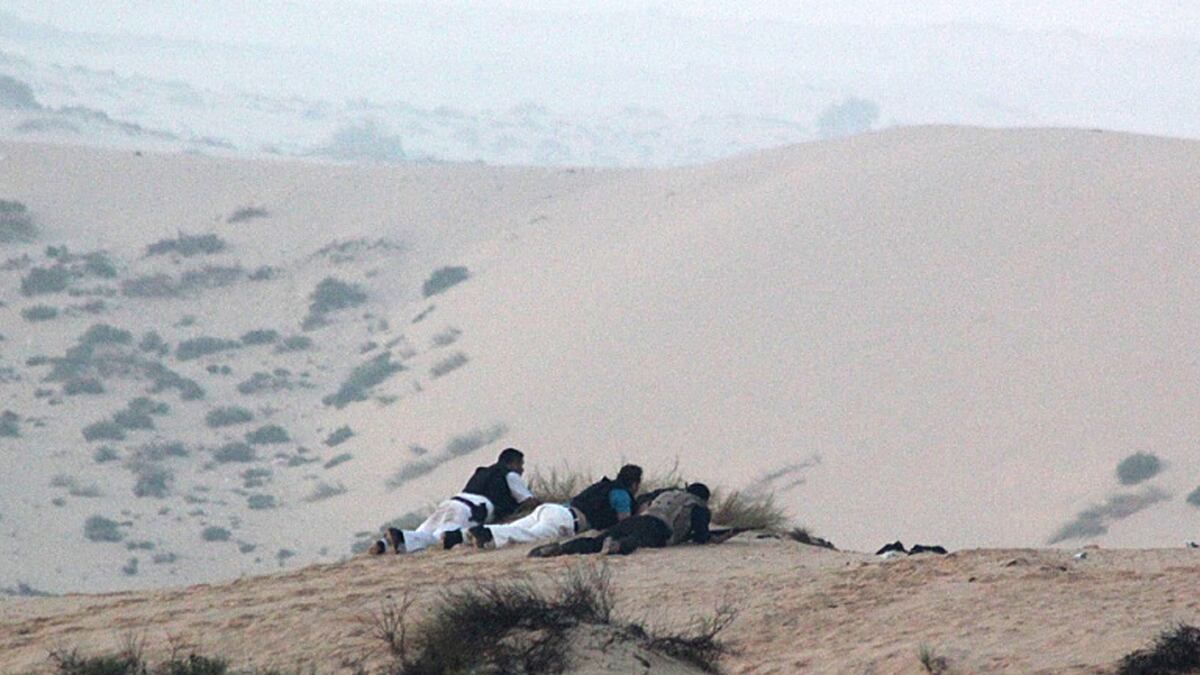Near the sand-strewn slopes of Gabal Halal, a rugged crest of mountain about 25 miles west of the Egyptian-Israeli border, the silence of the North Sinai Desert is broken only by the occasional gust of afternoon wind. Yet this silence belies a disturbing reality, as the Egyptian government says these low-lying peaks have become the frontline of the country’s war on terror–the Middle East’s very own Tora Bora.
Following a deadly attack that killed 16 Egyptian soldiers at a border post earlier this month, the national press reported a bevy of stories about an impending strike against jihadis camped out in the caves and crevasses of Gabal Halal. News of the strike came as Mohamed Morsi, Egypt’s fledgling president, hurled a political curveball on Sunday by forcing the retirement of Field Marshall Hussein Tantawi, the man who has ruled since the fall of Hosni Mubarak as head of the Supreme Council of the Armed Forces (SCAF).
Sunday’s front page splash from the independent daily, Al-Masry Al-Youm, left no room for doubt about what was ensuing. “The army begins its massive attack against Gabal Halal,” the paper wrote, citing unnamed sources, as it described how the military was engaged in a “fierce war against dangerous enemy terrorists.”
Yet this was news to Sheikh Sulayman, a Bedouin Arab in his 50s who lives in a tiny settlement about a half a mile from the foot of the mountain. “We haven’t seen anything,” he told The Daily Beast on the day of Al-Masry Al-Youm’s story. “No tanks, no planes and no helicopters.”
“In the media they are saying that Gabal Halal is like Tora Bora, but it’s completely wrong.”
Soldiers at a nearby checkpoint were equally ignorant of the Second Field Army’s landmark operation, asking The Daily Beast for any details about the supposed attack.

Other reports about the military’s crackdown in North Sinai—usually from an “unnamed security source”—appear to be exaggerated. Last week, various newspapers wrote that several people had been killed after the Army fired a missile at a home in Al-Goura, a village close to the main North Sinai coastal town of Al-Arish.
Locals in the village confirmed that there had been an attack, with one man revealing the twisted remains of a rocket, which had been fired into an outhouse by an Army helicopter. But he said nobody had been killed.
Meanwhile, a front-page story from the state-owned Al Ahram newspaper last week claimed that 60 “terrorists” had been killed in operations targeting the towns and villages around Al-Arish. But villagers in the area said they knew of nobody who had died during the campaign, while an official from Al-Arish General Hospital said no bodies had been received.
So what is going on? There is no doubt that militants are becoming more active in the North Sinai. Since last year’s revolution, when police and security forces melted away from Egypt’s streets, gunmen have launched a succession of audacious attacks against police stations and checkpoints around Al-Arish. The latest ambush happened on Monday, according to Reuters, though nobody was injured.
The Bedouin tribes who inhabit the vast Sinai wilderness suffered decades of underdevelopment, neglect and outright repression under the government of Hosni Mubarak, a legacy that has left a bitter taste in the mouths of many.
According to local political activist Khaled Saad, who once worked on the presidential campaign of Nobel Laureate Mohamed ElBaradei, the area’s location next to Israel and the Gaza Strip has also made it an attractive launch pad for radical groups like the Army of Islam, the Palestinian group responsible for the 2006 kidnapping of Gilad Shalit, an Israeli soldier who was released some five years later.
“Before the revolution they didn’t do anything because Hosni Mubarak was strong enough,” said Saad. “Their support comes from Gaza, though it isn’t clear if Hamas has a hand in it.”
When it comes to the North Sinai, it seems that the truth about Islamic militancy is just as strong as any fiction. But then why the apparent discrepancy between the government’s claims and the facts on the ground? Some say it’s just a PR campaign by the new government. And indeed, almost immediately after the attack on the Egyptian border post, Morsi sacked Sinai’s regional governor and his own intelligence chief in a bid to stamp his authority on the situation.
“They need to make it look like they are doing something,” said Egyptian TV cameraman, Ahmed Abu Deraa.
Yet Sunday’s move to terminate Tantawi went one step further, and analysts say the attacks provided Morsi an opportunity to take back presidential power after months of creeping authoritarianism on the part of the military. According to Koert DeBeuf, a representative of the EU Parliament based in Cairo, Morsi's dismissal of Tantawi was a "coup" supported by elements within the Army and triggered in part by the president's reaction to events in the Sinai.
"I think the weakness of the SCAF right now is that they are unable to react to Morsi. They are divided."
Yet some in Al-Arish caution that the fight against extremism in the Sinai won't be won by force alone. “People living here are only Egyptian on the map," said Yahya Abu Nasira, a Bedouin sheikh who lives near the Rafah border crossing into the Gaza Strip. “Ever since 1982, when Mubarak came to power, they have been excluded.”
If Morsi wants to end the violence, he may have to do more than send in the troops—real or imagined.






